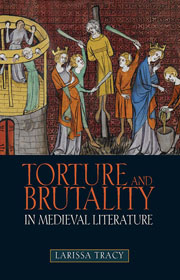Book contents
- Frontmatter
- Contents
- Acknowledgements
- Abbreviations
- Introduction
- 1 Rending the Flesh: The Orthodoxy of Torture in Hagiography
- 2 Resisting the Rod: Torture and the Anxieties of Continental Identity
- 3 The Matter of the North: Icelandic Sagas and Cultural Antonomy
- 4 The Matter of Britain: Defining English Identity in Opposition to Torture
- 5 Laughing at Pain: The Comic Uses of Torture and Brutality
- 6 Medieval Torture and Early-Modern Identity
- Conclusion
- Select Bibliography
- Index
5 - Laughing at Pain: The Comic Uses of Torture and Brutality
Published online by Cambridge University Press: 05 September 2013
- Frontmatter
- Contents
- Acknowledgements
- Abbreviations
- Introduction
- 1 Rending the Flesh: The Orthodoxy of Torture in Hagiography
- 2 Resisting the Rod: Torture and the Anxieties of Continental Identity
- 3 The Matter of the North: Icelandic Sagas and Cultural Antonomy
- 4 The Matter of Britain: Defining English Identity in Opposition to Torture
- 5 Laughing at Pain: The Comic Uses of Torture and Brutality
- 6 Medieval Torture and Early-Modern Identity
- Conclusion
- Select Bibliography
- Index
Summary
‘Comedy is born from the Komai – that is, from the peasant villages – as a joyous celebration after a meal or a feast. Comedy does not tell of famous and powerful men, but of base and ridiculous creatures, though not wicked; and it does not end with the death of the protagonist. It achieves the effect of the ridiculous by showing the defects and vices of ordinary men.’
Brother William of Baskerville, The Name of the Rose, Umberto Eco (p. 574)Medieval comedy is often the refuge for gratuitous violence where pain is inflicted without any consequences, where an audience can laugh at the discomfort or dysfunction of a person or an institution without the implications of suffering. Medieval folk humour developed outside the official sphere of high ideology and literature, and ‘in this unofficial existence medieval comedy was marked by exceptional radicalism, freedom, and ruthlessness’. Since laughter was often frowned upon in official and religious spheres, exceptional privilege of licence and lawlessness was bestowed outside these arenas: ‘in the marketplace, on feast days, in festive recreational literature. And medieval laughter knew how to use these privileges widely.’ However these privileges may have extended to ruthless displays of violence, there were boundaries to that violence and limits to the ultimate brutality of a joke in order for it to retain its humour. The representations of brutality in these texts are not mimetic; they are exaggerations of vigilante violence and brutality that satirize the excessive measures employed and question their validity.
- Type
- Chapter
- Information
- Torture and Brutality in Medieval LiteratureNegotiations of National Identity, pp. 191 - 242Publisher: Boydell & BrewerPrint publication year: 2012



